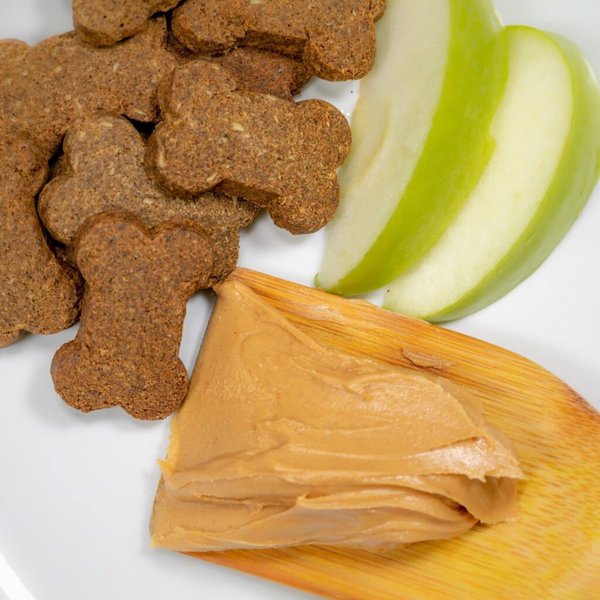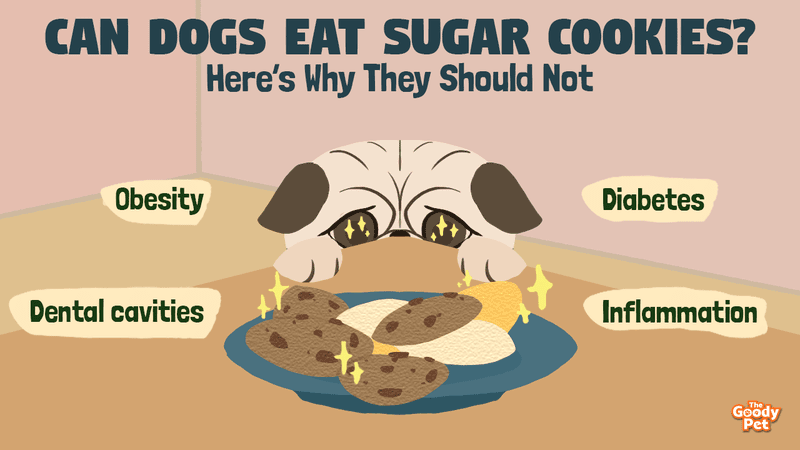My dog used to be addicted to the irresistible taste of sugar cookies, and yours might be too. Nonetheless, you may have concerns about your pooch’s preference for them, and to be honest, given the potential dangers and health risks associated with them, it’s a valid concern.
While dogs can eat sugar cookies, it is not healthy for them because of issues directly associated with rapidly fluctuating blood sugar levels, like diabetes. These problems, partly caused by the consumption of xylitol, could lead to the untimely death of your pup.
If you would like to know more about the effects of giving your dog sugar cookies and which cookies have the least adverse effects, this is the article for you!
What Happens If My Dog Eats A Sugar Cookie?

If your dog eats a sugar cookie, it may not have any side effects. Nonetheless, if the cookie has some toxic content or if your pooch eats too many unhealthy cookies over a long period, they may develop issues ranging from xylitol poisoning to diabetes.
Sugar cookies are one of the most terrible forms of cookies for dogs. They pose several risks to the health of your canine buddy, which could eventually lead to their death if not treated on time.
So, as you may be curious, some of the negative things that could happen if your dog eats too many sugar cookies include:
Obesity
Obesity is quite a serious problem for dogs. Obesity occurs when your dog’s weight increases abnormally. Typically, a weight increase is caused by an intake of excess calories. And you may wonder what causes this.
Well, the answer is that simple sugars, like glucose, tend to contain a lot of calories.
Normally, complex sugars, such as those in starch and fiber, do not have a high-calorie count because of their complex nature. Some of them require several digestive processes to break them down into absorbable glucose.
So, when complex sugars are ready to enter the bloodstream, they don’t drastically increase the calories in your dog’s body. However, it’s not the same story with added or simple sugars.
The normally processed sugar, glucose, used to make cookies is quickly ready to be absorbed into the bloodstream of your pooch. When simple or added sugars get absorbed, they immediately add calories to your dog’s body, causing obesity in the long run.
Unfortunately, the scary thing is that obesity makes your dog prone to other diseases, some of which are on this list.
Diabetes
Now, diabetes is one of the most common health issues dogs face. It is typically caused by the inability of your dog’s body to regulate blood sugar levels.
Type 1 Diabetes In Dogs
There are typically two kinds of diabetes in dogs: type 1 and type 2. Type 1 diabetes is the most common type in dogs, occurring when your canine pal’s body cannot create enough insulin to regulate the amount of sugar in its blood.
When your dog’s body cannot regulate its blood sugar, your dog becomes prone to the adverse effects of excessive sugar in the bloodstream. For example, one of the deadly conditions that could happen if your dog has type 1 diabetes is a recurring infection.
This usually means that if your pooch sustains any wounds, they can potentially succumb to the wounds and their infections. Imagine having to repeatedly treat the same wound as your dog.
Type 2 Diabetes In Dogs
Moving on, type 2 diabetes occurs when your dog’s body becomes unresponsive to insulin. So, type 2 diabetes is much worse than type 1 because you can’t just solve this with an extra shot of insulin.
As mentioned earlier, obesity typically predisposes your dog to more health issues. And type 2 diabetes is one of them. When your dog is overweight, the body produces hormones that make insulin useless.
Furthermore, the symptoms of type 2 diabetes are typically the same as type 1: abnormal thirst, frequent urination, weakness, sudden weight loss, and sometimes when it gets bad, cataracts. If your dog has either type of diabetes because of an unhealthy diet, it would be best to stop fanning the embers of illness by taking sugar cookies out of its diet.
Dental Cavities
Dental cavities pose a serious problem for dogs. Dental problems mostly arise because your pooch typically eats a lot of hard foods. So, when your dog is unable to chew well because of defects in the arrangement or condition of its teeth (dentition), more problems could arise.
Dental cavities are usually a progressive form of tooth decay. When the enamel of your canine’s tooth becomes increasingly weak, it becomes prone to dental cavities.
What weakens the teeth of dogs is a highly acidic medium in their mouths. And sugar tends to cause both high acidity and teeth weakening most of the time.
Sugar left in the mouth of your furry friend after eating a cookie creates a medium for certain kinds of bacteria to thrive. While the bacteria won’t hurt the teeth of your dog, their activity will.
While consuming sugar, bacteria secrete substances that make the liquid medium on the tongue and teeth of your pooch acidic. Sadly, this acid washes away the protective structures of each tooth, and before long, cavities may begin to appear in areas where the enamel is completely washed off.
Normally, dogs don’t face these issues, especially when they stick to their natural diets. Nonetheless, your furry friend’s dental health is at risk when you begin to feed them sugar cookies.
Inflammation
Obesity and diabetes typically predispose your dog to inflammation. While it’s hard to diagnose inflammation in its early stages on your own, especially if your dog is obese, the pain inflammation causes your pooch makes it easily detectable.
Inflammation is the abnormal swelling of tissues in your pup’s body. If your pooch has diabetes, it’s most likely that its legs will swell.
Vets normally diagnose the swelling as either steatitis (inflammation of fatty tissue) or skin inflammation. And both kinds of inflammation have disastrous effects if left untreated. One more reason these conditions are bad is that they’re chronic.
Such conditions are not like acute inflammations that happen suddenly and require little treatment to calm down. Unfortunately, these inflammations begin rather slowly, making the affected part swell slowly until they spread to other parts and become lethal to the dog.
An even worse effect, inflammation, could lead to paralysis of the part affected. And this would disrupt the normal life pattern of your dog.
So, if these aren’t enough reasons to dissuade you from giving your pooch sugar cookies, I’m sure the next reason will.
Diarrhea
Diarrhea is normally associated with humans, so you might be surprised to see it here. One reason people normally don’t think of dogs having diarrhea is that a bad diet causes it. Well, the same thing happens when dogs change their diet. And with sugar cookies, it’s even worse.
Enough fiber in your dog’s meal helps to process poop more easily. So, poop usually comes out as hard pellets, typically drained of excess liquid. However, if there is little fiber in a meal your dog ingests frequently, the reverse occurs.
While homemade sugar cookies may have low fiber, pre-made, packaged cookies are even lower in fiber. When your dog ingests cookies containing such low amounts of fiber, it will be unable to properly use all the water contained in its feed.
So, when your dog poops, rather than the usual solids that come out, you’ll see a liquid or barely solid substance. This may not be so bad on its own, especially if you learn how to clean up after your dog.
However, the excess liquids lost from the egestion of this watery poop could cause dehydration. What’s worse is if your pooch begins to vomit, which is common in dogs with diarrhea. Your dog could lose an incredible amount of fluid in these discharges, which could be fatal.
So, do you now see the negative effects of giving your dog cookies?
What Kind Of Sugar Cookies Are Bad For My Dog?

Sugar cookies tend to pose a serious issue for dogs. Nonetheless, some sugar cookies are worse than others and typically cause more serious damage to your canine. So, it’s not weird for you to wonder which ones pose the most risk to your dog’s well-being.
To answer that, the following sugar cookies are bad for your dog:
- Plain sugar cookies
- Chocolate chip cookies
- Lemon cookies
Plain Sugar Cookies
Plain sugar cookies are becoming a staple in homes and offices today. It’s pretty difficult to find a home where cookies and milk aren’t eaten at least once a week. While sugar cookies aren’t usually bad for humans when consumed in moderation, they can cause huge problems for dogs.
Most sugar cookies today are loaded with xylitol. Xylitol is a compound that many companies use to replace glucose when making sugar cookies. But while it doesn’t immediately endanger the lives of humans, xylitol can be instantaneously fatal to dogs.
When dogs eat a lot of sugar cookies containing xylitol, the substance enters their bloodstream and immediately activates the release of insulin from the pancreas. This rapid spike in insulin levels usually results in a proportionate decrease in blood sugar levels, causing hypoglycemia.
Unfortunately, what could follow hypoglycemia is liver failure, tremors, seizures, and lethargy. And if a vet doesn’t attend to your furry friend in time, there’s a high risk of you losing your beloved pooch.
So, with these life-threatening effects, plain sugar cookies are bad cookies that you shouldn’t overfeed to your puppy.
Chocolate Chip Cookies
Chocolate chip cookies are delicious cookies containing chopped pieces of chocolate. While humans can eat chocolate chip cookies, dogs, unfortunately, can’t because chocolate is toxic to dogs.
The main ingredient in chocolate chip cookies that makes them dangerous for your dog is the chocolate itself. Furthermore, the toxicity of chocolate to dogs is caused by its theobromine content.
Dogs can eat chocolate in minimal amounts. But sadly, just a few milligrams more than the tolerable dose of theobromine in your dog’s blood could cause it to suffer the effects of chocolate poisoning.
Vomiting, diarrhea, increased heart rates, and even seizures are some symptoms of chocolate poisoning. Ultimately, this can be fatal if swift medical attention isn’t given to your furry companion in time.
Thus, the effects of chocolate poisoning make chocolate chip cookies one of the worst kinds of sugar cookies you can give your pooch.
Lemon Cookies
Lemon cookies are another type of sugar cookie that dogs should avoid. Not only do they contain high sugar content but also additional chemicals, namely, citric acid and psoralens.
Both citric acid and psoralens are often found in lemons in reasonable quantities. Lemons are dangerous to the health of your canine. Typically, when a dog eats more lemon cookies than its body can allow, it suffers from the effects of lemon poisoning.
Unfortunately, symptoms of this toxicity range from diarrhea to lethargy, tremors, and ultimately death. These effects, coupled with excessive sugar or xylitol, make lemon cookies dangerous for your canine buddy.
Can I Give My Dog Sugar Cookies?
Nonetheless, you can still give your dog sugar cookies, but it would be best if you did not due to the list of health risks that its consumption brings about.

How Many Cookies Can My Dog Eat?
It would be best to give your dog no more than three cookies in a week. However, the number of cookies your dog can eat largely depends on the ingredients used to make them.
Healthier cookies made from whole-grain nuts do not affect your pooch as much as sugar cookies do. So, the number of whole-grain cookies you can give your dog will be more than that of sugar cookies.
The high dose of sugar your dog gets when eating sugar cookies is one reason it’s best to give it little quantities each day. Excessive sugar alone forms more than 90% of the problems associated with your dog eating sugar cookies.
Furthermore, packaged cookies tend to come with an incredible amount of saturated fats. Every 3.5 oz of sugar cookies contains about 0.67 oz of fat — almost 20% of its entire content! So, sadly, if your dog consumes too many sugar cookies, it will experience many health concerns.
Thus, you should keep the number of cookies you give your dog to a minimum level, especially sugar cookies.
What Kind Of Cookies Can My Dog Eat?
With all the negative effects of giving your dog cookies, you will most likely not want to give your furry friend any more cookies. Nonetheless, you face an immediate problem when your dog is addicted to cookies.
So, you may wonder which kind of cookies you can give your dog. The following kinds of cookies are good for dogs:
- Whole-grain cookies
- Fruit-embedded cookies
- Cookie crumbs with dog food

Whole-Grain Cookies
One major problem with most cookies is that they lack an appropriate fiber content. For example, a 3.5 oz sugar cookie contains only 900 mg of sugar — less than 1% of its total content! As I have mentioned, cookies with such little amount of fiber could lead to gastrointestinal issues, including diarrhea.
On the other hand, the same quantity of a high-fiber multigrain cookie contains about 0.4 oz of fiber, more than 10% of its total mass. Here, you can see the massive difference. Giving your dog this kind of cookie will reduce the risk of diarrhea.
Apart from the nutritional advantages whole-grain cookies bring, they also tend to help to slow the absorption of sugar into your pooch’s bloodstream. Fiber helps to keep glucose digestion slow and steady.
Furthermore, the fiber in your pooch’s gut aids smooth digestion and the maintenance of a healthy microbial ecosystem.
Fruit-Embedded Cookies
Fruit-embedded cookies are another alternative to typical sugar cookies. You can easily make a cookie like this at home. You can mix low-sugar cookie dough with some shredded high-fiber fruit. Apples, raspberries, and even coconut are perfect options for this.
One major advantage of fruit-embedded cookies is that they contain complex sugars that also come with fiber. Apart from the several processes needed to break down complex sugar into absorbable glucose, complex sugar also contains fiber that helps regulate the amount of sugar in the bloodstream.
Furthermore, complex sugar helps provide your pooch with certain necessary vitamins. For example, if you put just 0.7 oz of shredded apple into low-sugar cookie dough, it will have about 0.9 mg of vitamin C when baked.
Also, raspberries contain a lot of antioxidants. These chemicals help your pooch’s body get rid of the most harmful content in its body; this includes certain oxidized compounds.
Furthermore, antioxidants help remove reactive oxygen species in your pooch’s food that are dangerous to its health. So, a homemade raspberry cookie is a great option for your pooch.
Cookie Crumbs With Dog Food
Sometimes, you may not have access to ingredients that will enable you to make the cookies mentioned above. Or perhaps a sudden change in the kind of cookies your furry friend eats would make a cookieless appealing.
Well, here’s a simple solution: incorporate small amounts of cookies into the dog food you give your pooch.
There’s a high chance that the dog will pick out the cookie crumbs and eat them. If they aren’t enough, it will go for dog food. It would be best to do this with a portion of delicious dog food, as those that do not appeal to your dog may make it uninterested in the meal.
Furthermore, please take note of the number of cookies you put in. If you put in too many cookie crumbs, then you’d cancel out the healthy reason for following this procedure.
How Do I Know My Dog Is Okay After Eating Cookies?
If your dog has recovered from eating an unhealthy amount of sugar cookies, especially after showing symptoms, it will simply return to its former activity level.
However, to be more specific, here are some signs you should watch out for:
- Brighter countenance
- Better appetite
- Willingness to play
- Normal heartbeats
- General happiness






